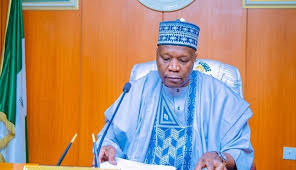
Iliyasu Abdullahi Bah
Gombe State Governor Muhammadu Inuwa Yahaya has raised concerns over what he described as inadequate compensation from the Federal Government following the takeover of the state-owned National Youth Service Corps (NYSC) orientation camp in Malam Sidi for a national de-radicalization program. His remarks underscore the persistent financial burden placed on states when federal initiatives are implemented without proportional restitution.
The Malam Sidi facility, originally constructed under former Governor Ibrahim Dankwambo’s administration, was meant to serve thousands of corps members mobilized annually to the state. However, the Federal Government later converted the camp into the operational base of Operation Safe Corridor (OPSC)—a Defense Headquarters program designed for the deradicalization, rehabilitation, and reintegration of former Boko Haram insurgents.
Governor Yahaya, speaking through the Secretary to the State Government, Professor Ibrahim Njodi, disclosed that the Federal Government provided a sum of ₦1.4 billion as compensation for the permanent use of the camp. But this amount, he explained, falls far below the real cost borne by the state in constructing an entirely new orientation facility for corps members in Boltongo district.
“To continue hosting our NYSC orientation exercises, we were compelled to build a completely new camp from scratch in Boltongo. So far, the state has spent over ₦5 billion on this project—almost three times the compensation received. This has created a huge and unplanned strain on our finances,” Yahaya lamented.
Despite this imbalance, Governor Yahaya emphasized that Gombe remains committed to supporting national security priorities. He explained that his government not only absorbed the financial shock but also played a central role in engaging the Malam Sidi community, whose initial fears about hosting repentant insurgents were palpable.
“Through constant dialogue, community sensitization, and partnership with security agencies, we were able to win the trust of our people. Without this cooperation, the program could not have succeeded in Malam Sidi,” Yahaya said.
Indeed, Gombe’s experience highlights the often-overlooked political dimension of hosting sensitive federal programs. The rehabilitation of ex-insurgents has always been controversial, with sections of the public expressing skepticism about reintegration into communities that have suffered violence. Gombe’s ability to balance national interest with local concerns has been described by analysts as a delicate act of governance.
Governor Yahaya’s remarks came during a courtesy visit by a delegation of senior military officers from the Defence Headquarters, led by Rear Admiral Suleiman Haruna Abdullahi. The team was in Gombe for an administrative assessment of Operation Safe Corridor.
Rear Admiral Abdullahi commended the state government for its steadfast support. “We have engaged with traditional rulers, religious leaders, and other stakeholders in Malam Sidi and its environs to understand the realities on the ground. Our findings will be submitted to the Defence Headquarters to ensure better governance of the program,” he said.
The military delegation further acknowledged the unique challenges faced by host states, stressing that sustained state cooperation remains vital to the success of rehabilitation and reintegration processes.
The Gombe case has reignited conversations about Nigeria’s federal structure and the financial pressures it places on states. Analysts argue that while national security is a collective responsibility, states should not be left to shoulder disproportionate costs, especially when federal programs disrupt existing state infrastructure.
“This is not just about Gombe. It is about fairness in federalism. If the Federal Government appropriates state assets for national programs, then compensation should reflect the full economic and social costs,” said Dr. Tanimu Bello, a public policy analyst based in Abuja.
Others suggest that the current arrangement discourages states from investing heavily in infrastructure, fearing that such facilities could be commandeered without adequate restitution. “The Boltongo camp alone shows that states can act responsibly. But if they are not adequately supported, it creates disincentives,” added Grace Aliyu, a lecturer in Political Science at Gombe State University.
For Gombe, the financial gap—₦5 billion spent versus ₦1.4 billion received—illustrates the urgent need for a more equitable cost-sharing framework. Beyond figures, however, the state’s sacrifice represents a commitment to national healing in a region scarred by insurgency.
Governor Yahaya’s administration has insisted that while the program is noble and essential for peace, equity demands that states like Gombe should not be left to bear the brunt alone. “We will continue to support national security, but it is only fair that the Federal Government meets states halfway,” Njodi stressed.
As Operation Safe Corridor continues in Malam Sidi, the spotlight on Gombe serves as a reminder of the balance Nigeria must strike between central authority and state capacity. Without a deliberate effort to strengthen federal-state cooperation in both policy and finance, the burden of national programs may risk overstretching willing but resource-constrained states.
The unfolding case in Gombe is thus more than a financial dispute—it is a microcosm of Nigeria’s larger struggle with federal equity, governance, and the costs of peacebuilding in a fragile region.
